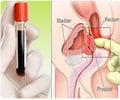Men with high-risk prostate cancer, who are treated at hospitals with a high proportion of administered radical local treatment, only have half the mortality risk.

‘Men with very high-risk prostate cancer, who are treated at hospitals with a high proportion of administered radical local treatment, only have half of the mortality risk of men who are treated at hospitals with the lowest proportion.’





Using patient data from the National Prostate Cancer Register (NPCR) of Sweden, the researchers investigated the link between prostatectomy or full-dose radiotherapy and mortality in men with deadly high-risk prostate cancer. Differences in treatment selection were analyzed on a group basis whereas mortality from prostate cancer and other causes was analyzed on an individual basis. Results show that men with a very high-risk prostate cancer, who were treated at hospitals with the highest proportion of radical treatment, were only half as likely (mortality rate ratio; MRR 0.51) to die from prostate cancer compared to men treated at hospitals where radical local therapy was administered the least. However, since this was an observational study, the potential effects of high-intensity in diagnostic activity and work-up cannot be isolated from therapeutic activity.
"Our data suggests that there are benefits of radical local therapy for men with very advanced forms of prostate cancer. However, these men most often only receive hormonal treatment. To confirm our findings and hopefully to improve treatment praxis, there is a need for a randomized study of the effects of local radical therapy on patients with very high-risk prostate cancer," says Stattin.
Source-Eurekalert



![Prostate Specific Antigen [PSA] & Prostate Cancer Diagnosis Prostate Specific Antigen [PSA] & Prostate Cancer Diagnosis](https://images.medindia.net/patientinfo/120_100/prostate-specific-antigen.jpg)










